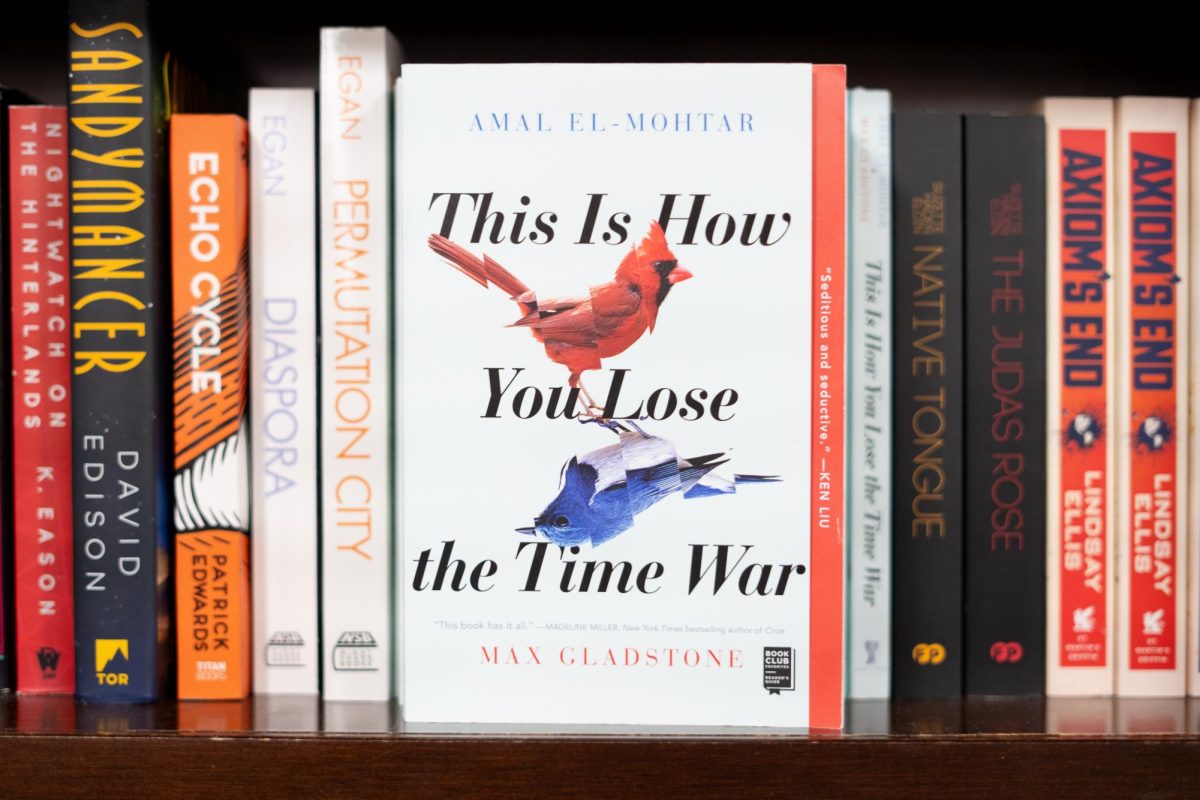Late last month, the Department of Education called Biden’s book ban initiative — which worked to fight book bannings and prevent them from violating the students’civil rights — a “hoax.” The end of this initiative has further bolstered a national wave of conservative censorship that seeks to ban literature that dares to explore race, gender and sexuality. The government’s message is clear: LGBTQ+ art is under attack. In times of uncertainty, there is comfort and solidarity to be found in refusing to let these works be abandoned. In February, as Valentine’s Day has us thinking about connection and love, it’s important to reflect on a variety of experiences, not just those considered normative.
“Angels Before Man” by Rafael Nicólas
“A hand that strikes from the dark is at least proof of a hand. It’s kinder to be beaten than to be left untouched.”
“Angels Before Man” is a novel as lush and verdant as the paradise it depicts. A queer retelling of the fall of Satan, Nicólas’ debut novel follows timid Lucifer, the youngest and most beautiful of the Lord’s creations, as he falls in love and seeks purpose in a seemingly perfect world. Conflict ensues as Lucifer’s attention is split between a budding romance and a jealous god. I picked up this book over winter break, hungry for an LGBTQ+ romance that could satiate that religious trauma craving, and Nicólas did not disappoint. A brilliant exploration of shame, autonomy and queer rage, “Angels Before Man” challenges its readers to reconsider what it means to be good, and sucker punches you with a pining slow burn so sweet it hurts.
“This Is How You Lose the Time War” by Amal El-Mohtar and Max Gladstone
“I’ll be all the poets, I’ll kill them all and take each one’s place in turn, and every time love’s written in all the strands it will be to you.”
I’m wary of time travel in fiction. High school physics left me with a grudge against science fiction and its wobbly mechanics. This Hugo Award winner was one I approached apprehensively, but it utterly devastated me in the best way. “This Is How You Lose the Time War” is a sapphic love story that spans time and space. Red belongs to the Agency, a cyberpunk-esque, technological society seeking to steer humanity toward militarism through brute force. Blue serves the Garden, an organic, interconnected hive mind that is more subtle in its approach, quietly planting seeds of control across timelines. Red and Blue are rival agents and unlikely pen pals. As their relationship deepens, the danger of discovery reaches its fever pitch. Witty and beautifully crafted, “This Is How You Lose the Time War” is an ambitious novel that digs its teeth in deep and doesn’t let go.
“Giovanni’s Room” by James Baldwin
“Nobody can stay in the garden of Eden.”
James Baldwin, a civil rights leader and brilliant writer for whom art was activism, was one of America’s most influential novelists. His second novel, “Giovanni’s Room,” is a potent examination of masculinity and guilt, well-deserving of its fame. David is an American man who finds himself alone in 1950s Paris. While his girlfriend, Hella, is away in Spain, he wrestles with his homosexuality, trapped in a world that condemns him to conformity. In Paris, he meets Giovanni — young, whip-smart and pretty — and the two begin a love affair doomed to tragedy. Ultimately, David must choose between his dangerous love for Giovanni and a comfortable, traditional life with Hella. “Giovanni’s Room” is a book of fearsome honesty that, forever relevant, cuts to the bone.
“Stone Butch Blues” by Leslie Feinberg
“I’m not saying we’ll live to see some sort of paradise. But just fighting for a change makes you stronger.”
Even 30 years after its original publication, “Stone Butch Blues” remains a cornerstone of LGBTQ+ literature — revolutionary in its discussion of transgender identity, sexuality, police brutality and labor, Feinberg crafts a novel as comforting as it is devastating. The story follows Jess Goldberg from adolescence to adulthood. From childhood, Jess knows she does not fit into the gendered ideals of 1940s Buffalo, New York. Drowning beneath the weight of inescapable difference, she finds solidarity in her local lesbian community. Jess explores her masculinity as a young lesbian and searches for love in a world hostile to her very existence. Battling abuse from law enforcement, her family and her workplace, she remains steadfast. A coming-of-age story about hope and pain, Jess encapsulates the spirit of LGBTQ+ perseverance in the face of hatred and violence. A free version of the novel is available on Feinberg’s website.
Contact Taylor Morgan at [email protected].
























































































































































